Since its founding in 1885, the Bachchor Heidelberg has played an integral role in the cultural life of the city. And thanks to its historically close relationship with the university and the city’s orchestra, it has become one of the longest-lived oratorio choirs in Germany. Its story has been driven chiefly by its conductors. Looking back on their efforts over the past 140 years, it’s remarkable what skill and creative energy they all brought to the choir, with each one contributing in his own way to the choir’s achievements.
1885-1918: Philipp Wolfrum
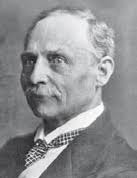
It proved a great stroke of luck when, in 1884, Philipp Wolfrum was appointed to the University of Heidelberg – on the recommendation of no less than Joseph Rheinberger! This was not only meant to improve music training for prospective theologians, but also to build up choirs that could maintain those sacred music traditions in Heidelberg. At the time, the University’s upcoming 500th anniversary underscored the need for a choir with a scholarly bent. While in other cities, oratorio choirs were already a part of 19th century musical life – having taken momentum from the “singing movement” and the rediscovery of Bach’s passions –, in Heidelberg, this element was still missing.
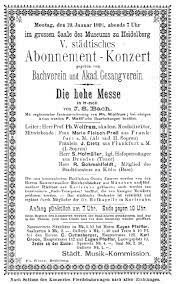
Wolfrum, who was born in 1854 in Upper Franconia as the son of a cantor, had by the age of nine already stood in for his father at the organ; a scholar at the Royal School of Music in Munich when he was appointed, he enjoyed a reputation as a creative musician. In Heidelberg, he quickly founded two choirs: the academic choral society, which was mainly made up of theology students; and a choir “for the cultivation of serious – that is, sacred – choral music, especially that of Joh. Seb. Bach”, to be performed by “ladies and gentlemen who have experience with singing”. Since 5 June 1885, the Bachchor has rehearsed every Thursday evening starting at “8 o’clock sharp”. Its first concert, on 22 February 1886, featured Beethoven’s Mass in C major and a Bach cantata. The Bachchor also made a highly acclaimed appearance at the University’s anniversary celebration in 1886, where Wolfrum shone with his own major composition. He fundamentally shaped Heidelberg’s musical life, initiating the founding of the municipal orchestra and making Heidelberg into a city of music known beyond its regional boundaries. Between 1891 and 1931, guest conductors of the Bachchor included Engelbert Humperdinck, Richard Strauss, Gustav Mahler and Max Reger. Wolfrum’s loyalty to the Bachchor was surely a factor in his remaining in Heidelberg despite many recruitments from elsewhere. His tireless work only came to an end when he fell ill in 1918 and died the following year.
1918-1956: Hermann Meinhard Poppen
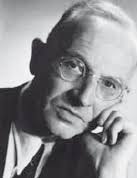
Hermann Poppen, born in Heidelberg in 1885, was Philipp Wolfrum’s assistant at the Department of Musicology from 1908 to 1910. A student of Max Reger’s, his career had repeatedly brought him into association with Heidelberg and Wolfrum. After Wolfram’s death, Poppen took over as university music director, and the Bachchor also chose him as its director. Because the Bachchor also had responsibility for the city’s philharmonic concerts, he also became their music director. One of his major accomplishments was the founding of the Institute for Evangelical Church Music in 1931, known today as the Hochschule für Kirchenmusik.
Poppen initially continued in Wolfrum’s style but later developed his own, distinctly different approach. He set new priorities in the co-organization of church services, raising appreciation for a cappella singing and embracing an innovative interpretation of Bach’s works. He also performed them with a smaller choir and orchestra, so that “the interweaving of the lines emerges more clearly”. During Poppen’s tenure, Heidelberg’s reputation as a city of music continued to grow. He was able to attract such notable guest conductors as Wilhelm Furtwängler and Albert Schweitzer, and, anchored by the participation of the Bachchor, the city hosted the 19th German Bach Festival, among other conferences and festivals of nationwide importance. He was also the one who “discovered” Dietrich Fischer-Dieskau, whose performance of Johannes Brahms’ German Requiem under Poppen’s baton still lives on in memory.
Thanks to Poppen’s social commitment, not only did the Bachchor play an important role in the musical life of the city, it also gave benefit concerts and sang in hospitals. Poppen even organized a passion to be performed in the Bruchsal prison. He died in 1956, after 37 years of productive work for the Bachchor.
1956-1986: Erich Hübner
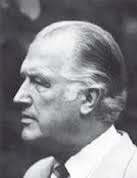
These were big shoes to be filled, but a worthy successor was found in Erich Hübner, who was born in Leipzig in 1917. Having already helped out during Poppen’s illness, Hübner was elected by the Bachchor that same year. The period under his baton is characterized by an opening up of the repertoire to include contemporary pieces; many premieres of modern composers enriched the musical experience of Heidelberg’s concert-going public. But he also introduced compositions by old masters whose music the Bachchor had never performed before, such as Claudio Monteverdi. This required a lot of work with the – by then very large – choir, which had swelled to over 200 members. At the same time, Hübner succeeded in inspiring many young singers to join. As president of the Association of Evangelical Church Musicians in Germany, he safeguarded Heidelberg’s national significance to the music scene. For the Bachchor’s 75th anniversary in 1960, he introduced the “Heidelberg Bach Week” series, and in 1969 secured the 44th German Bach Festival for Heidelberg. To celebrate the choir’s 100th anniversary in 1985, he had planned to hold the 6th Heidelberg Bach Week – but alas, he did not live to see this to fruition. Nonetheless, the Bachchor’s 100th anniversary was celebrated in June 1985 with a concert program featuring works by Bach, Reger and Fortner, representing its wide-ranging repertoire. The choir’s history and the work of its three artistic directors to date were honored in an exhibition at Heidelberg Castle and in a commemorative publication (Dr. Renate Steiger, ed.). This opus not only provides scientific yet vividly descriptive information about the Bachchor itself, but it also illustrates the development of an oratorio choir founded in the 19th century. Support from the city was provided for the Bachchor to set up an archive; since then, these holdings have been freely available for music research.
As president of the Association of Evangelical Church Musicians in Germany, he safeguarded Heidelberg’s national significance to the music scene. For the Bachchor’s 75th anniversary in 1960, he introduced the “Heidelberg Bach Week” series, and in 1969 secured the 44th German Bach Festival for Heidelberg. To celebrate the choir’s 100th anniversary in 1985, he had planned to hold the 6th Heidelberg Bach Week – but alas, he did not live to see this to fruition. Nonetheless, the Bachchor’s 100th anniversary was celebrated in June 1985 with a concert program featuring works by Bach, Reger and Fortner, representing its wide-ranging repertoire. The choir’s history and the work of its three artistic directors to date were honored in an exhibition at Heidelberg Castle and in a commemorative publication (Dr. Renate Steiger, ed.). This opus not only provides scientific yet vividly descriptive information about the Bachchor itself, but it also illustrates the development of an oratorio choir founded in the 19th century. Support from the city was provided for the Bachchor to set up an archive; since then, these holdings have been freely available for music research.
1986-2025: Christian Kabitz
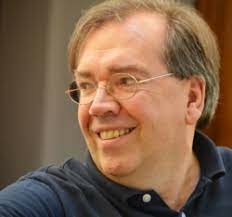
In the fall of 1986, a new artistic director was appointed: Christian Kabitz, church music director in Würzburg and conductor of the Bach Choir there. Under Kabitz, who was born in Nuremberg in 1950, the choir entered a period of supra-regional concert activity. In 1988, he also assumed direction of the Frankfurt Cäcilienchor as his third major oratorio choir. In the years following, collaboration between the three groups culminated in projects within the framework of the Rheingau Festival, choir trips to Monreale/Sicily and the USA, as well as two television appearances on the ZDF program “Achtung Klassik”. In summer, the Bachchor regularly took part in the delightful “Culinary Court Concerts” in Wachenheim. And who can forget the trips to Leipzig and Dresden in 2005 and 2006, with concerts in St. Thomas Church and the Frauenkirche!
Despite these extracurricular activities, focus remained on continuation of the Bachchor’s role as the concert choir for the city of Heidelberg. Over the decades, one of the great constants in the activity of the choir has been performing in the four annual “Bachchor Concerts” with the city’s Philharmonic Orchestra. Ever keen to supplement its mainstay of choral works by Bach with music from other eras, especially the contemporary, the choir has always offered a wide but balanced repertoire. Premieres (by Franck, Elgar, Berlioz, McCartney) have therefore repeatedly been included in the program.
Under Kabitz, the Bachchor – representing Heidelberg – also visited its sister cities Rehovot (1991 and 1993), Montpellier (1991), Bautzen (1991) and Simferopol (1999). The choir’s trip to Israel in 1993, with its corresponding counter visit by the Israel Youth Philharmonic Orchestra, is still considered a highlight. The two ensembles performed the Brahms Requiem and Schönberg’s “A Survivor from Warsaw” in several concerts, including in Tel Aviv and in Heidelberg. In 2005, the Bachchor sang Handel’s Messiah in Shanghai as part of the “German Culture Week”, and in 2009 it performed Mozart’s Requiem in Rome. The choir also participated in official events of the university, such as the International Luther Congress in 1997.
Until 2005, almost all concerts were conducted by Kabitz; only rarely were there guest conductors such as Dietrich Fischer-Dieskau (1998) or those from the Philharmonic Orchestra. This changed in 2005, when, for the first time in over a hundred years, a partnership agreement was signed between the Bachchor and the Theater Heidelberg, contractually regulating the cooperation between the two institutions. Through these negotiations, one thing became clear: the great interest from the Philharmonic Orchestra in regularly conducting choral concerts! Since then, up to two Bachchor concerts a year have been directed by conductors from the orchestra. The Bachchor greatly appreciates the privilege of working with the city’s orchestra. Due in no small part to this stable constellation, which is unique in Germany, not only does the Bachchor count among the choirs with the richest and longest-running traditions, it has also consistently been able to offer uninterrupted concert activity. Working with such conductors as Cornelius Meister, Volker Christ, Noam Zur, Dietger Holm and Jan Schweiger – all outcomes of the cooperation agreement – has brought the choir new perspectives on the artistic diversity of musical interpretations and differences in choral preparation; it has also strengthened the choir’s awareness of its own ability.
Written by Gabriele Becker (translation by Mary Beth Robinson)


